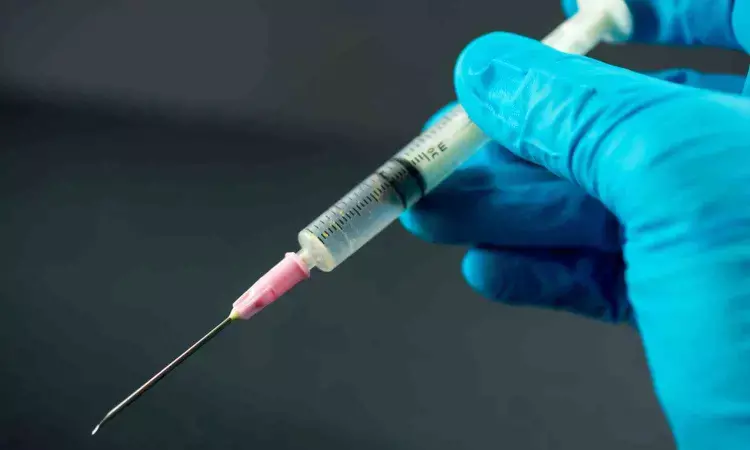- Home
- Medical news & Guidelines
- Anesthesiology
- Cardiology and CTVS
- Critical Care
- Dentistry
- Dermatology
- Diabetes and Endocrinology
- ENT
- Gastroenterology
- Medicine
- Nephrology
- Neurology
- Obstretics-Gynaecology
- Oncology
- Ophthalmology
- Orthopaedics
- Pediatrics-Neonatology
- Psychiatry
- Pulmonology
- Radiology
- Surgery
- Urology
- Laboratory Medicine
- Diet
- Nursing
- Paramedical
- Physiotherapy
- Health news
- Fact Check
- Bone Health Fact Check
- Brain Health Fact Check
- Cancer Related Fact Check
- Child Care Fact Check
- Dental and oral health fact check
- Diabetes and metabolic health fact check
- Diet and Nutrition Fact Check
- Eye and ENT Care Fact Check
- Fitness fact check
- Gut health fact check
- Heart health fact check
- Kidney health fact check
- Medical education fact check
- Men's health fact check
- Respiratory fact check
- Skin and hair care fact check
- Vaccine and Immunization fact check
- Women's health fact check
- AYUSH
- State News
- Andaman and Nicobar Islands
- Andhra Pradesh
- Arunachal Pradesh
- Assam
- Bihar
- Chandigarh
- Chattisgarh
- Dadra and Nagar Haveli
- Daman and Diu
- Delhi
- Goa
- Gujarat
- Haryana
- Himachal Pradesh
- Jammu & Kashmir
- Jharkhand
- Karnataka
- Kerala
- Ladakh
- Lakshadweep
- Madhya Pradesh
- Maharashtra
- Manipur
- Meghalaya
- Mizoram
- Nagaland
- Odisha
- Puducherry
- Punjab
- Rajasthan
- Sikkim
- Tamil Nadu
- Telangana
- Tripura
- Uttar Pradesh
- Uttrakhand
- West Bengal
- Medical Education
- Industry
Monthly IM Vitamin D Injections Effective in Achieving Optimal Serum Levels compared to oral administration: Study

Rabies
Vitamin D is imperative to maintain bone and mineral health with an essential role in calcium absorption and bone density. Given its significance, determining the most effective method to achieve and maintain optimal vitamin D levels has been a focal point of research. A recent study published in the Journal of Basic and Clinical Physiology and Pharmacology illuminated on this by comparing three different vitamin D supplementation strategies in a randomized trial, revealing that monthly intramuscular (IM) injections are superior to oral tablets and sachets.
This open-label randomized trial included a total of 132 participants, aged 18 to 60, all of whom had initial serum vitamin D levels below 30 ng/mL, which is considered insufficient for optimal bone health. The participants were divided into 3 intervention groups:
- Group A: Daily oral vitamin D tablet (800 I.U.)
- Group B: Weekly oral vitamin D sachet (60,000 I.U.)
- Group C: Monthly intramuscular vitamin D injection (300,000 I.U.)
The primary objective was to assess the changes in serum vitamin D levels at six and 12 weeks across these groups and to determine the most effective route for achieving sufficient vitamin D levels which was defined as ≥30 ng/mL. These results highlighted the superior efficacy of the monthly IM injections in increasing and maintaining vitamin D levels. At 6 weeks, Group C, which received the IM injections, had the highest mean serum vitamin D levels by reaching 38.38 ng/mL that significantly outperformed the other groups. This trend continued at 12 weeks, with mean levels in the IM group rising to 48.15 ng/mL. At the 6-week mark, only 34.8% of participants in the IM group remained insufficient, a figure that dropped to just 6.8% by 12 weeks. In contrast, participants in the oral tablet and sachet groups showed slower and less pronounced improvements in their vitamin D levels.
The 100% sufficiency rate observed in the IM group by 12 weeks illuminated the potential of this route for individuals who struggle with oral supplementation or require rapid correction of vitamin D levels. Given the critical role of vitamin D in bone and mineral balance, clinicians might consider the monthly IM injection as a preferred strategy for patients with significant deficiency or those needing prompt improvement in their vitamin D status. Overall, the study suggests that monthly IM injections provide a more effective approach to achieving vitamin D sufficiency when compared to oral supplementation.
Source:
Agarwal, N., Lohani, P., & Singh, S. (2024). Oral vs. injected: which vitamin D boost works best for low levels? In Journal of Basic and Clinical Physiology and Pharmacology. Walter de Gruyter GmbH. https://doi.org/10.1515/jbcpp-2024-0018
Neuroscience Masters graduate
Jacinthlyn Sylvia, a Neuroscience Master's graduate from Chennai has worked extensively in deciphering the neurobiology of cognition and motor control in aging. She also has spread-out exposure to Neurosurgery from her Bachelor’s. She is currently involved in active Neuro-Oncology research. She is an upcoming neuroscientist with a fiery passion for writing. Her news cover at Medical Dialogues feature recent discoveries and updates from the healthcare and biomedical research fields. She can be reached at editorial@medicaldialogues.in
Dr Kamal Kant Kohli-MBBS, DTCD- a chest specialist with more than 30 years of practice and a flair for writing clinical articles, Dr Kamal Kant Kohli joined Medical Dialogues as a Chief Editor of Medical News. Besides writing articles, as an editor, he proofreads and verifies all the medical content published on Medical Dialogues including those coming from journals, studies,medical conferences,guidelines etc. Email: drkohli@medicaldialogues.in. Contact no. 011-43720751


